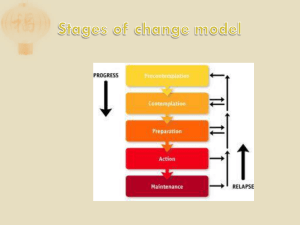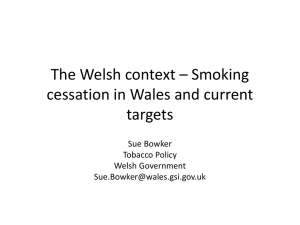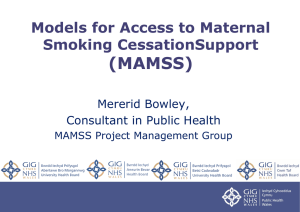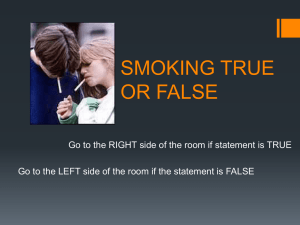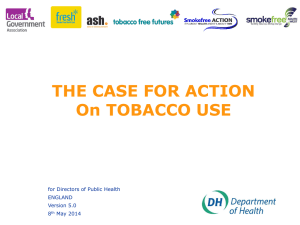Why SMART Moms? - Middle Tennessee State University
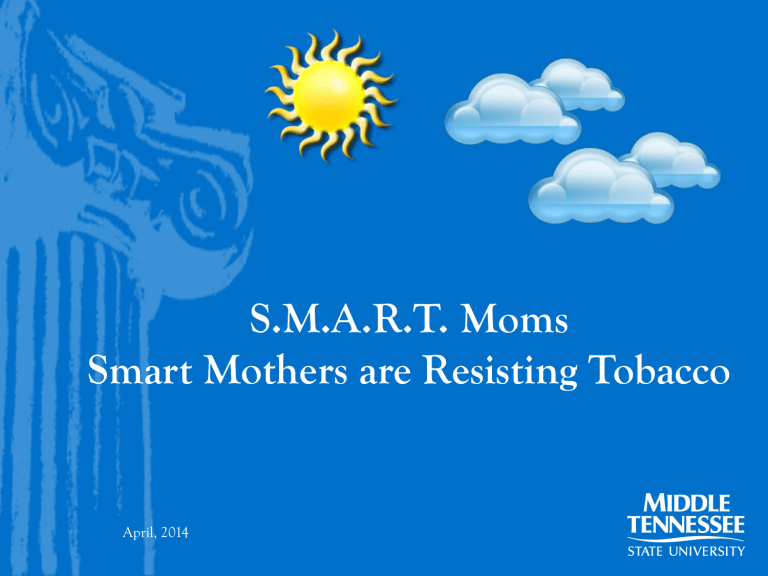
S.M.A.R.T. Moms
Smart Mothers are Resisting Tobacco
April, 2014
Welcome and Introductions
Please Note!
While this training program was developed specifically for Tennessee, it may also be used by other states interested in implementing a similar prenatal smoking cessation model.
The S.M.A.R.T. Moms project staff welcome questions and inquiries from other states!
This training program is available online – with details provided later in this presentation on accessing the online materials - and may also be modified to be carried out as a live training.
Planning a Live Training?
Plan on FOUR HOURS to cover the agenda as outlined in this presentation.
Agenda
• Welcome and Introductions
• Review of Training Objectives
• Why S.M.A.R.T. Moms?
• Overview of S.M.A.R.T. Moms
• Key Concepts in Smoking Cessation for Pregnant Women:
Risks of Smoking in Pregnancy
5 A’s and 5 R’s of Tobacco Cessation
Motivational Interviewing
Pharmacotherapy
• Implementation of S.M.A.R.T. Moms
• Questions and wrap-up
Training Objectives
• To have a better understanding of the S.M.A.R.T. Moms program
• To recall the 5 A’s of the tobacco practice guidelines for counseling a patient who is ready to quit smoking
• To recall the 5 R’s of the tobacco practice guidelines for counseling a patient who does not want to quit smoking and to be able to effectively address roadblocks such as stress and weight gain
• To identify three techniques of motivational interviewing for counseling patients
• State the risk of smoking during pregnancy to the fetus
• State the risk of smoking during pregnancy on the infant/child post-delivery
• Understand the clinical trial data on pharmacotherapy for smoking cessation during pregnancy
• Verbalize process for counseling pregnant patients about using pharmacotherapy to aid in smoking cessation
• Be able to identify steps required to fully implement the S.M.A.R.T. Moms program with patients
Why S.M.A.R.T. Moms?
• In 2012, 22.7% of all women in Tennessee smoked (BRFS)
• 17.1% of women in Tennessee smoked throughout pregnancy (CDC, 2011)
• In 2011, 13,486 babies were born to women who smoked (TDH, 2013)
• As many as 29% of pregnant WIC patients smoke in some regions of Tennessee
(TDH, Neonatal Summary Report , 2012)
• According to the Office of the Surgeon General, smoking is THE most important modifiable cause of poor health for women, noting specifically poor pregnancy outcomes and poor reproductive health.
Why S.M.A.R.T. Moms?
Providers Can Make a Difference!
As a health care provider, you can make a tremendous impact on your patients’ health.
“A brief cessation counseling session of 5-15 minutes, when delivered by a trained provider with the provision of pregnancy specific, self help materials significantly increases rates of cessation among pregnant smokers.”
(Tobacco Control 2000; Vol. 9,Suppl 3:iii80-iii84,September 2000, BMJ Publishing Group
Ltd.)
Overview of S.M.A.R.T. Moms
• Originally implemented in Tennessee from 2002 to 2006 as part of a grant from the
March of Dimes, and administered through MTSU’s Center for Health and Human
Services, with the TN Dept. of Health (TDH) as a project partner
• Primarily implemented in WIC clinics, though also with private providers
• The grant became self-sustaining and continues to date, most recently in 2013 being cited by TDH as a “Rising Star” Effective Practices program for Tennessee counties receiving Tobacco Settlement dollars.
• During the initial grant period, the S.M.A.R.T. Moms project trained providers in best practices smoking-cessation techniques for pregnant women, allowing them to counsel over 13,000 women between 2002 and 2006 when the project was fully funded.
Overview of S.M.A.R.T. Moms
• A toolkit has been developed to assist other states and organizations in developing similar programs and to orient providers in TN new to the program with how it may be implemented.
• S.M.A.R.T. Moms is based on the “5 A’s” approach to smoking cessation—Asking, Assessing, Advising, Assisting, and Arranging— which is an evidence-based method that is used in many programs.
• The 5 A’s described in the kit and included in the training are taken from “Treating
Tobacco Use and Dependence: A Clinical Practice Guideline,” produced by the U.S.
Public Health Service.
Overview of S.M.A.R.T. Moms
• Key components of the program are:
Tool Kit
Training
• Tobacco Consultation Record
Patient Self-Help Guide
Tennessee Tobacco Quitline Resources
Overview of S.M.A.R.T. Moms
• At the end of the funded grant period for the pilot project, over 13,000 pregnant women had been counseled by trained providers using “best practices,” 5 A’sbased counseling since the inception of the project in 2002.
• Approximately 77 percent of women who received the self-help guide and counseling agreed to attempt smoking cessation.
• Statewide, 24.4 percent of those who received counseling AND the cessation guide AND for whom smoking cessation data was available, quit smoking.
• Statewide, 21.4 percent of those who did not receive the guide but were counseled AND who had complete data records on smoking cessation quit smoking.
•
Key Concepts in Smoking Cessation for Pregnant
Women
• Risks of Smoking in Pregnancy
• 5 A’s and 5 R’s of Tobacco Cessation
• Motivational Interviewing
• Pharmacotherapy
Online provider training for prenatal smoking cessation provided though Joan C. Edwards School of Medicine at Marshall
University
For those who are participating in a live training session, the session will include viewing the web-based training to address these topics.
Key Concepts in Smoking Cessation for Pregnant
Women
•
Online provider training:
• Features Dr. Lynne Goebel, MD, Internal Medicine, and Dr.
Brenda Mitchell, MD, OB/GYN
• Includes printable materials, certificate of completion for providers
• Patient scenarios and interactive activities as part of the training
• Visit Marshall University’s Website at
• http://www.musom.marshall.edu/medctr/med/tobaccocessati on/pregnancyandsmoking/login.aspx
Key Concepts in Smoking Cessation for Pregnant
Women
NOTE TO ONLINE TRAINING PARTICIPANTS:
•
Before completing this PowerPoint presentation, please click on the link below or cut and paste in your browser and follow the instructions to complete the online training.
http://www.musom.marshall.edu/medctr/med/tobaccocessation/pregnancyandsmoking
/login.aspx
After completing the online training, please return to this presentation to view the remainder of this presentation.
Video Summary: Key Concepts in Smoking
Cessation for Pregnant Women
• Tobacco Cessation Guidelines:
• 5 A’s – Ask, Advise, Assess, Assist, Arrange
• 5 R’s – Relevance, Risks, Rewards, Roadblocks, Repetition
Motivational Interviewing:
• Decision Analysis – “Good” or “Bad” about staying the same, and about changing
• OARS – Open-ended questions, Affirm, Reflect, Summarize
• Ready, Important, Successful
Video Summary: Key Concepts in Smoking
Cessation for Pregnant Women
• Pharmacotherapy
• Weigh risks of medication against benefit of not smoking
• No large randomized control trials to confirm safety
• More like to be necessary for heavy smokers – i.e., those smoking more than 1 pack per day
• Behavioral Intervention “Cold-Turkey” is first line treatment
S.M.A.R.T. Moms – Online Training
Participants
•
Before completing this PowerPoint Presentation, please click on the link below or cut and paste in your browser and download a copy of the
S.M.A.R.T. Moms tool kit for review.
http://www.mtsu.edu/achcs/current_projects.php
After reviewing the toolkit, please return to this presentation to complete the training session.
•
Implementing S.M.A.R.T. Moms
Easy Implementation Steps:
• Participate in training (online or live training session) and review materials including the toolkit.
• Train other staff working with prenatal women.
• Provide multiple copies of “Tobacco Consultation Record,” the
5 A’s-based patient self-help guide, and other patient education materials on smoking and tobacco to staff working directly with pregnant women.
• Begin counseling patients using techniques learned through the online learning modules.
• Share patient education materials and resources, including information on the Tennessee Tobacco Quitline.
• Collect all completed Tobacco Consultation Records and give to director who will submit to S.M.A.R.T. Moms staff on a quarterly basis.
•
Implementing S.M.A.R.T. Moms
Tobacco Consultation Record Form
NOTE that EVERY pregnant smoker will have a completed consultation form, including postpartum data.
ONLY women indicating a commitment to quit smoking will receive the cessation guide, but EVERY pregnant smoker will have the completed form with postpartum data.
Tobacco
Consultation
•
Implementing S.M.A.R.T. Moms
More on the Tobacco Consultation Record:
• The Tobacco Consultation Record should be completed for each patient that smokes – regardless of her intent to quit.
• Form is kept in the patient’s records until the postpartum visit is completed.
• Forms are collected by director and submitted to S.M.A.R.T.
Moms project staff quarterly.
• All information is kept confidential and there is no identifying patient information.
• Study ID will be filled in if that information is needed; if there is nothing in this line, please leave it blank.
•
Implementing S.M.A.R.T. Moms:
• ALL prenatal patients that currently smoke are eligible for this smoking cessation intervention.
Need Materials? Forms? Questions about
S.M.A.R.T. Moms?
Please Contact:
Dr. Jo Edwards martha.edwards@mtsu.edu
615-898-2905
Cynthia Chafin cynthia.chafin@mtsu.edu
615-898-5493
Caron Petersen caron.petersen@mtsu.edu
615-494-8986
•
Post-Test, Evaluations, and CEUs/CMEs
• For those participating in a live training, this is the portion of the agenda where post-tests, evaluations, and CEUs/CMEs will be addressed.

